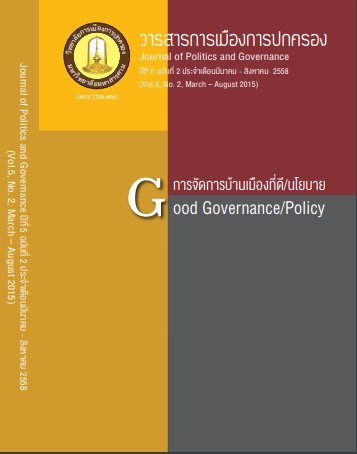Anti-Corruption and Governance Challenges in Southeast ASIA: Toward the ASEAN Political-Security Community Agenda
Main Article Content
Abstract
Governance and corruption are closely interlinked. There is a reciprocal relationship between corruption and governance. The World Bank underlines that corruption undermines good governance, and bad governance produces corruption. Corruption and governance issues have become a serious concern in Southeast Asia countries. Conditions of such massive corruption in some countries in ASEAN make the issue of corruption in this region always wrapped around the development process which is carried out. The Corruption Perception Index (CPI) score in most of the ASEAN member countries are relatively poor, except Singapore and Brunei. Corruption has become viral in every country that can influences bad governance system and human development index is not good. This paper outlines the issues of corruption and governance as a working agenda of ASEAN towards APSC 2015. It is important to have strategic steps in fighting corruption and achieving good governance that must be taken by each ASEAN member by imitating on best strategies undertaken by neighboring countries. The roles of ASEAN as a cooperation organization in the ASEAN region should be able to be a bridge to the creation of the ASEAN region free from corruption through promote strengthening of anti-corruption institution.
Article Details

This work is licensed under a Creative Commons Attribution-NonCommercial-NoDerivatives 4.0 International License.
References
Baylist, John., and Others (ed.). Strategy in Contemporary World: An Introduction to Strategic Studies. Oxford University Press. New York.
Bardhan, Pranab. (1997). Corruption and developmen: A Review issues. Journal of economic Literature. Vol. XXXV (September 1997), 1320-1346.
Bardhan, P. & Mookherjee, D. (2000). Capture and Governance at Local and National Levels. American Economic Review. 90 (2). 135-39.
Collins, Alan. (2007). Contemporary Security Studies.Oxford University Press. New York.
Corruption Eradication Commission of Republic Indonesia (http://www.kpk.go.id)
Gong, Ting. (2006). Corruption and Local Governance: the double identity of Chinese Local Government in Market Reform. The Pacific review. Vol. 19. No. 1 (March 2006). 85-102.
Gould, David J. , Reyes, Amaro & A., Jose. (1983). The Effects of Corruption on Administrative Performance: Illustration from Developing Countries. World Bank Staff Working Paper (Number 580). Management and Development Series Number 7. The World bank. Washington D.C.
Hoadley, Stephen & Ruland, Jurgen. (2006). Asian Security Reassessed. Singapore Institute of Southeast Asian Studies.
Kronggkaew, Medhi. (2009). Cooperation and Competition among Anti-Corruptin Authorities in Thailand. Paper presented at the Conference on Evidence-Based Anti-Corruption Policy, orgized by the National Anti-Corruption Commission of Thailand, and World Bank, in Bangkok, 5-6 June 2009
National Anti-Corruption Commission (NACC)(http://www.nacc.go.th/ewt_news.php?nid=938)
Widmalm, Sten. (2008). Decentralisation, Corruption and Social Capital: From India to The West. Sage Publications India Pvt Ltd. New Delhi.
http://www.world-governance.org
Http://web.worldbank.org


